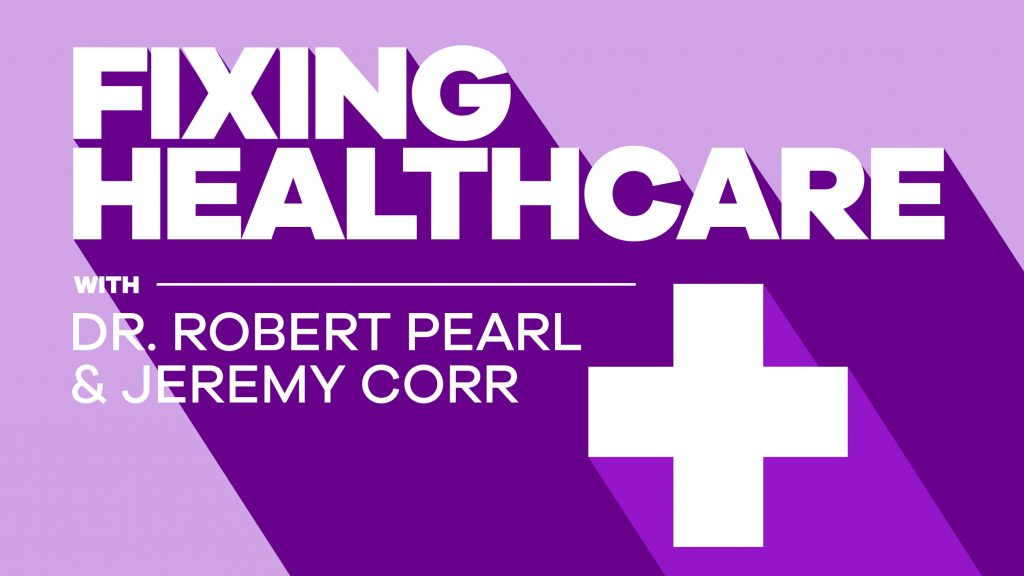Podcast: Play in new window | Download
Subscribe: Spotify | Email | RSS | More
The Fixing Healthcare podcast continued its quest this month for a candidate worthy to fill the highly coveted (and totally fictitious) role of “Leader of American Healthcare.”
Dr. David T. Feinberg is president and CEO of Geisinger, one of the nation’s largest health services organizations. He’s also triple-board certified by the American Board of Psychiatry and Neurology in child, adolescent and addiction psychiatry. Prior to joining Geisinger, Feinberg served as CEO of UCLA’s hospitals, associate vice chancellor of UCLA Health Sciences, and president of UCLA Health System.
When asked to present his plan for fixing American healthcare, Dr. Feinberg immediately seized the attention of co-hosts Dr. Robert Pearl and Jeremy Corr.
“I think your question is actually really easy,” he said.
With that, here are some of Dr. Feinberg’s most memorable quotes from the show:
Fixing healthcare in America is the simplest thing we can do. The problem is, we’ve been looking at the wrong problem … Really what we need to do is say, “Well, what does drive health, and what does drive mortality?” We probably get 20% of whether we live or die, whether we have life in our years and years in our life, based on going to good doctors and good hospitals. We’re going to put all of our efforts in my plan, or the majority of effort, on all the other stuff, the stuff that really matters: your genetic code, your zip code, your social environment, your access to clean food, your access to transportation, how much loneliness you have or don’t have.
I run a health system and we have about 13 or so hospitals and I think my job is to close every one of them. I think a lot of patients, even the ones that you managed well but ended up in the hospital, could be managed better at home. We look at our highest utilizers, our sickest patients. We show up at their house in two cars, because we can’t all fit in one car, and we got a nurse, a palliative care nurse, a community health worker, a pharmacist, a doc. We say, “Hi, sir or ma’am, we’re here to take care of you, and our goal is you never go in the hospital again and we know you’ve been hospitalized 12 times in the last year. Let’s clean out the medicine cabinet. Let’s make sure the house is safe. Oh, you have a bunch of appointments that are hard for you to get to? We’ll do them through telemedicine right now at the kitchen table.” Just completely eliminate the need for those folks to ever go in the hospital again.
Why do people have to come to a doctor now? I don’t go to the bookstore anymore. I don’t go to my travel agent anymore. I can actually do so much through my phone, why can’t I tell you here what my symptoms are, and can you hook me up with someone who can help me? If I do need medicines, why don’t you just drone them to my house? Those types of interventions I think are coming and those disruptions are absolutely crucial.
When I was born, the chances of me developing type two diabetes was 1 in 100. If I were born today, the chances of me developing type two diabetes is 1 in 3. That’s not a genetic change. Something happened in our food. We spend more on obesity than we spend on defense. Somewhere between 3% and 7% of GDP is spent on obesity, and that’s a new problem. So, if we’re going to fix American healthcare, we’ve got to put aside American healthcare for a second and figure out how come people aren’t exercising?
If we look at your genome now, we can find medically actionable conditions that we can prevent in advance. We can find half the people that wouldn’t know they had BRCA based on their family history and intervene early. We can literally save lives based on your genetics, and that’s probably about 10% or 20% of my plan.
Eating right, normal BMI, not smoking, alcohol in moderation, not shooting one another, getting preventive screenings will decrease healthcare costs overall by 50% in the United States. 50% of the disorders we’re paying for are lifestyle disorders. So, we’ve now cut healthcare costs in half. We have happy employers. We just decreased hospitalizations by 50%. By definition, there’s going to be less errors because there’s less people going through the hospital. I’m happy to talk more about how can we improve quality and measures, but we’re missing this big picture of understanding people’s genetic code, their zip code, their micro-environment, and really what drives behavior. That’s what’s costing us so much in American healthcare.
We hoped you enjoyed this episode of “Fixing Healthcare.” A very big thanks to Dr. David Feinberg for coming on the show and sharing his bold ideas.
Next month, our guest will be Dr. Eric Topol, the founder and director of Scripps Research Translational Institute. Dr. Topol is the author of the bestselling books, The Creative Destruction of Medicine and The Patient Will See You Now. He also serves as the chief academic officer for Scripps Health, a professor of genomics at the Scripps Research Institute, a senior consultant at the division of cardiovascular diseases at Scripps Clinic. We’re looking forward to having him on the show.
READ: Full transcript of our discussion with Dr. Feinberg
* * *
Fixing Healthcare is a co-production of Dr. Robert Pearl and Jeremy Corr. Subscribe to the show via Apple Podcasts or wherever you find podcasts. Join the conversation or suggest a guest by following the show on Twitter and LinkedIn.

